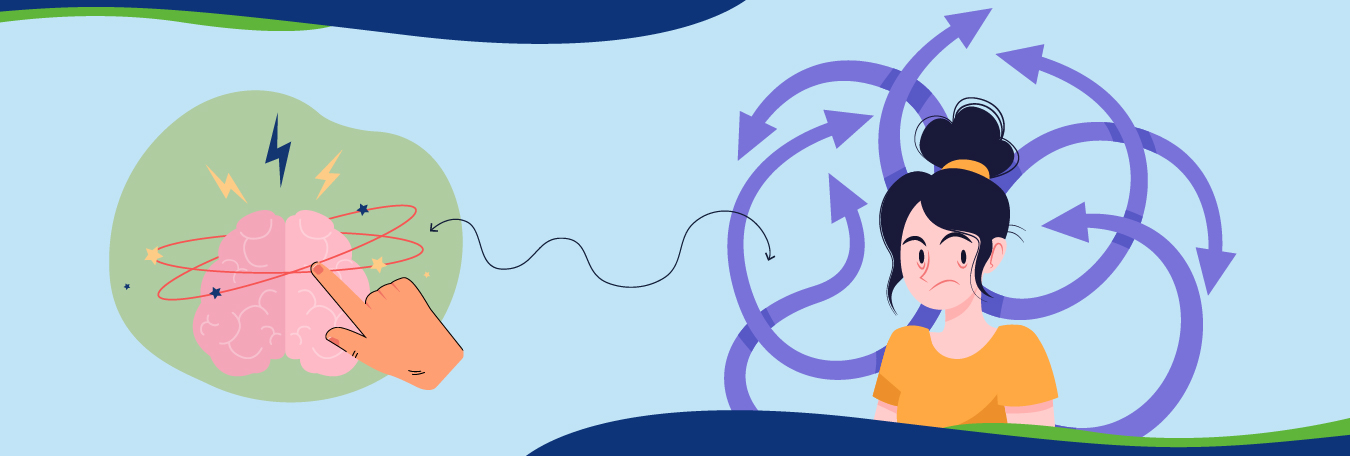Do you feel guilty of slow learning and not paying the desired attention to the important tasks?
You might be thinking that you are slow or careless, and a lazy person.
This could be because you might have attention-deficit/hyperactivity disorder (ADHD), or your brain produces low dopamine.
But what is the connection between ADHD and dopamine chemicals in the brain?
ADHD is a brain disorder that changes the way the brain functions that directly affecting focus and motivation.
Dopamine is a neurotransmitter that plays a role in brain function, like attention, motivation, and reward.
Individuals with attention deficit/hyperactivity disorder often have changed dopamine levels and function. Research has found a link between low dopamine and ADHD. While low dopamine may not directly cause ADHD, it contributes to its symptoms and makes it harder for people to stay on track, especially in professional and educational life.
Recognizing the brain system and accepting that the ADHD brain works differently helps you practice self-compassion rather than self-blame.
But dopamine is not the only factor that contributes to ADHD symptoms. Many other factors are responsible for the heightened ADHD disorder.
However, in this blog, you will get to know the relationship between the ADHD brain and dopamine.
What Is Dopamine?
Dopamine is an important neurotransmitter in the brain that plays an important role in regulating many aspects of human behavior and health. These could be behaviors, motivation, mood, memory, attention, and emotional control.
This can be a key element of the brain’s reward system because dopamine is released during happy or enjoyable moments and activities. It creates a feeling of satisfaction that reinforces behaviors and leads to positive outcomes.
Specifically, it encourages individuals to pursue goals, helps coordinate and regulate movement, and reinforces learning and memory by strengthening associations with positive experiences.

It is essential to have a balanced level of dopamine for promoting feelings of happiness and well-being, while imbalances can contribute to a low mood or lack of motivation.
What is ADHD?
ADHD is a neurodevelopmental disorder that is typically diagnosed in childhood, though it often persists in adulthood. It is characterized by a persistent and pairing pattern of inattention, hyperactivity, and impulsiveness that is more severe than what is normally expected for a person’s age.
Want to Know More About ADHD :
What is ADHD? Let’s Discuss Everything About It!
Common symptoms of ADHD are:
- Making careless mistakes
- Difficulty maintaining tasks
- Appearing not to listen when spoken to directly
- Excessive talking or interrupting others
- Difficulty waiting for one’s turn
- Acting without thinking through the consequences
- Feeling restless or on the go
What are the Causes Of ADHD?
The exact cause of ADHD is unknown, but research suggests a combination of factors, including genetics and environment. It is considered a dysfunction of executive functioning, which is controlled by the frontal lobes of the brain.
Some studies show that individuals with ADHD may have differences in the brain anatomy and function, including lower levels of dopamine, which affects attention and motivation.
What Is The Link Between Dopamine And ADHD?
Dopamine is responsible for many key functions in the brain, like mood, working, memory, attention, motivation, and decision-making. It is a type of neurotransmitter that has several important functions in the brain and body. It also regulates the reward system of the brain, with its levels increasing when a person experiences something pleasurable, like eating a delicious food or a desired activity.
Did You Know: What is ADHD Goal Setting?
The link between dopamine and ADHD is that people with ADHD may have lower levels of dopamine or a less responsive dopamine system. It affects their activities and motivation, attention, and reward. This can make it harder for them to focus, stay motivated for long-term goals. However, this can also weaken them to activities that provide immediate rewards.
What Does The Research Say About ADHD And Dopamine?
Scientists are also studying the role of dopamine in the development of ADHD. They initially believe that ADHD arises if dopamine levels are low. But they have realized that the relationship is a little more complicated.
However, research confirms a strong and complex link between ADHD and the brain’s dopamine system. Rather than a simple deficiency, studies indicate a dysfunctional dopamine regulation system that significantly contributes to ADHD symptoms, like inattention, impulsivity, and low motivation. This means dopamine transporter abnormalities.
Research suggests that some people with ADHD have a higher density of dopamine transporters (DAT) in their brain’s striatum.
Genetic factors
- Involvement of dopamine-related genes: Strong evidence points to genetic factors that affect dopamine production and regulation in the development of ADHD. Variants in genes related to dopamine receptors (like the DRD2 gene) and the enzyme that helps convert dopamine to norepinephrine have been implicated.
- Polygenetic inheritance: While specific dopamine genes have been linked to an increased risk of ADHD and related behaviors, researchers acknowledge that the disorder is likely the result of multiple genes acting together, rather than a single gene.

ADHD Treatment And Dopamine
ADHD treatment often aims to increase dopamine levels in the brain. A strong case for the link between dopamine and ADHD is the fact that some treatments work directly on dopamine levels and reduce ADHD symptoms.
Extensive research confirms that ADHD is treatable, with strong evidence that supports a combination of medication and behavioral interventions.
Get to Know About: Understanding Time Blindness ADHD Symptom
Multimodal Approach:
The most effective approach is a comprehensive plan that combines pharmacology and psychosocial therapies.
Pharmacology
Stimulant medications are often the first-line treatment and have the strongest evidence for reducing core symptoms. Non-stimulant medications are also effective for many individuals. But this can only be prescribed by the psychiatrists.
Therapies
- Cognitive Behavioral Therapy (CBT)
Cognitive behavioral therapy CBT helps adults to develop coping mechanis ms, while parents and teachers training in behavioral techniques are effective for children. Therapy for adults can help them cope better with their symptoms. CBT can be regarded as the most effective therapy for ADHD.
It helps them recognize negative thinking patterns and behaviors while helping them to develop coping mechanisms to improve dopamine regulation.
Learn More: What’s With The Object Permanence ADHD Symptom?
Mindfulness-based therapy in particular can be beneficial for ADHDers. This form of CBT integrates mindfulness and meditation. It can improve focus, reduce stress, and enhance emotional regulation.
Some research suggests that this form of CBT may even help strengthen the effectiveness of dopamine-increasing medication in ADHD.
- Combined therapy
There is little evidence that adding therapy to medication is more effective than medication alone for symptom reduction. But it can provide significant benefits for improving functional impairment and managing co-occurring conditions like anxiety and low self-esteem.
Takeaway
Inconsistent dopamine levels may be a contributing factor to ADHD symptoms. However, more research is needed to solidify that dopamine reduction increases the disorder symptoms. However, some methods and therapies are there to increase the levels of dopamine and relieve some of the ADHD symptoms.




